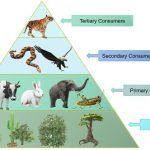A major difference between surface water and groundwater is the location where they are found. On one side, you may find the surface water on the external parts of the earth’s crust, i.e. on the surface level. Rivers, streams, lakes, ponds etc., are the most common examples of sources of surface water. In contrast, the groundwater is present in the interior parts of the … [Read more...] about Difference Between Surface Water and Groundwater
Ecology
Difference Between Natural and Artificial Ecosystem
Ecosystems, whether natural or artificial, both rely on the cosmic principles of nature. However, there are other differences between these two systems, including creation, purpose, diversity, susceptibility, sustainability, etc. The natural ecosystem is the outcome of the constant interplay between living and non-living organisms, as well as the environment in which they … [Read more...] about Difference Between Natural and Artificial Ecosystem
Difference Between Producers and Consumers
The meaning of producer and consumer is obvious and evident from their names themselves. Producers, in general, are those who create something, whereas consumers are those who utilize something. The term 'Producers' is used in biology to describe the living entities that have the potential to produce food from natural elements like sunlight, carbon dioxide, water, etc. The … [Read more...] about Difference Between Producers and Consumers
Difference Between Scavenger and Decomposer
Scavenger is the organisms that break apart the dead and decayed matter into smaller particles. In contrast, decomposer is such organisms that further break-down or decompose the dead matter (dead plants and animals). As a result, they provide nutrients to the soil by producing products such as nitrogen, phosphorus, calcium. Therefore we can say that scavengers are the one … [Read more...] about Difference Between Scavenger and Decomposer
Difference Between Mutualism, Commensalism and Parasitism
When both the partners or organisms get benefits from one another by living together is known mutualism. When only one partner or organism gets benefits without any effect on the other is commensalism. When one partner or organism gets benefits while the other is harmed is known as parasitism. Mutualism, Commensalism and Parasitism are the kinds of symbiosis relationship or … [Read more...] about Difference Between Mutualism, Commensalism and Parasitism





